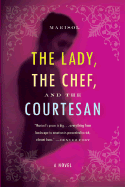Some books tell inexpressiby beautiful stories; some tell common stories but with such finesse and expression that they become remarkable. Chéri is one of the latter. There is nothing extraordinary about a broken heart, after all.
Colette, the author of Chéri, is notorious in France both for her outrageous lifestyle and views, and her works of fiction. My personal feeling is that Chéri is one of the best classics I've read. The emotional punch the ending packs is phenomenal, not because it is good writing (which it is) but rather because Colette draws her characters so skilfully. Without being too explicit in detailing thoughts, emotions or personal habits, she creates characters so real that the reader is left wanting to know how it ends for them - I'm still absolutely reeling from the punch Colette delivered at the end of Chéri. I hadn't realised quite how immersed in the story I'd been, or how much I liked Léa, the female lead.
If you haven't read Chéri but are planning to, stop reading now because I'm going to reveal some of the plot and characters and I don't want to prejudice your own reading.
Chéri is a typical spoiled angel incarnate; utterly beautiful and desirable, but turns out to be (as Bridget Jones might put it) a bit of a fuckwit. He embarks on a six year love affair with Léa, a contemporary of his mother's and several years his senior. Although both refuse to admit it, when the time comes for Chéri to marry and they are ripped apart, both realise how much they love each other and spend a torturous six months wondering how the other's life is progressing. Léa suffers especially; a beauty as a young woman, at fifty she has become old and lost her looks and with them any chance for real love. To disguise her longing for Chéri, she creates a fictitious lover with the (possibly unrealised) intention of making Chéri jealous. Finally, Chéri gives in to his desire for Léa and storms into her apartment at midnight to declare his love for her and the two are reunited. Léa's relief is as evident as her love for him, and for a few hours perfect happiness is hers. Upon waking up in the morning, as Chéri watches Léa in unfavourable daylight, he notes her wrinkles and changing figure and realises that he does not want Léa. Chéri probably doesn't possess the self awareness to understand himself, but his change of heart is a combination of many factors, not least finding out that what he thought all along he couldn't have never did belong to another. There follows a fight between the two, and this is how it all ends. Colette is inexpressibly cruel.
She closed the door behind him, and silence put an end to her vain and desperate words. She heard Chéri stumble on the staircase and she ran to the window. He was going down the steps, and then he stopped in the middle of the courtyard.
"He's coming back! He's coming back!" she cried, raising her arms.
An old woman, out of breath, repeated her movements in the long pier-glass, and Léa wondered what she could have in common with that crazy creature.
Chéri continued on his way toward the street. On the pavement he buttoned up his overcoat to hide his crumpled shirt. Léa let the curtain fall back into place; but already she had seen Chéri throw back his head, look up at the spring sky and chestnut trees in flower, and fill his lungs with the fresh air, like a man escaping from prison.














